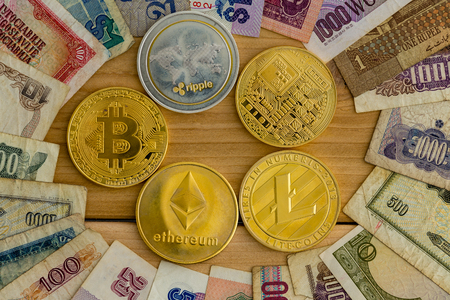
The Blockchain industry is here and doesn’t joke about what it does. Satoshi Nakamoto is a genius about how they put together an accurate system that puts third parties aside in transaction confirmation. Blockchain came to eliminate the long processes in transactions and the huge fees that are required to move money from one point to another. Bitcoin has simplified the process by taking the fees to up to a few cents for a cross-border transaction.
Banks and traditional financial institutions are known for having long procedures for opening an account and the approval depends on the bank. The bank looks at factors that favour it rather than what favours the user. Bank require a person to give all the information about themselves even that which may be irrelevant.
Removing humans from making decisions

What the blockchain industry ecosystem does is, removing humans from making decisions. Decentralised Finance will not need approval from a bank for anyone to borrow or lend money. All requirements are automated, if the person meets them, then they can carry out the required transaction. If they don’t meet them then the transaction won’t happen. Decentralised Finance will not discriminate against a person because it doesn’t use faces to approve transactions.
Satoshi Nakamoto in his writings came up with the idea of decentralised finance during the 2007 House Bubble Burst. He points out how Central Banks breaches contracts in loan processing and money transfer. He talked about how people have to trust banks with their credentials and in return, the bank will lend the account holder a fraction of their reserve. Bitcoin first goal is to remove bank and intermediaries in the transfer of value.
A lot of changes to be relevant in the financial world
Soon, banks will have to make a lot of changes to be relevant in the financial world. Unless these banks and traditional financial institutions make changes people will shift from banks to cryptocurrencies. The reasons are clear;
- Putting money in a bank will earn someone 1% or even less. On the other hand, one can put a million-dollar into a yield farming or staking account and make up to 15% in profit great deal, isn’t it? Banks will make a profit off people money through car loans and mortgages and the account holder doesn’t make anything while the bank makes up to 8%. If people understand this, they will in the end move from bank deposits to staking accounts and Yield farming accounts.
- Banks need a lot of information and trust before they lend money. Bank loans come with huge interests and underlying transaction fees that make the process expensive. Decentralised Finance will lend a user money and charge lower fees compared to what banks charge. Furthermore, the lending process on the DeFi ecosystem doesn’t require a lot of credentials. Also, DeFi will not have any hidden charges in the processing of loans.
- For a loan, payment banks will not use your reserve unless you default payment. A user will borrow against their stack on the DeFi ecosystem and since they are required to pay a small interest rate, they can comfortably raise the interest and even more as the staking amount earns a profit.
- To keep off capital gain taxes, people will borrow against their stack, and not sell. This will keep deposits profitable. Traditional financial institutions will charge a user bill for having money in the bank and they will still charge huge taxes if one makes a big investment.
Organisations are making changes in the adoption of cryptocurrencies
Tesla started accepting Bitcoin as a form of payment for its vehicles. Although they discontinued it due to environmental concerns that come with Bitcoin mining, they have confirmed they will embark on it if there is clean and renewable energy in the mining process.
General Motors came in not confirming the adoption of any coin. However, they said if a client happens to want to pay with Bitcoin they will accept.

El Salvador has passed the bill to make Bitcoin a legal tender. This move will solve the 70% of Salvadorians who do not have bank accounts. Bitcoin will reduce fees charged in making remittances which is a major source of money in the country.
In conclusion, if most countries adopt Blockchain technology then the banks will be irrelevant in the next decade. If not banks will then have to work like the Blockchain industry.
This article is not investment advice. Do your own research before investing in the cryptocurrency market.

